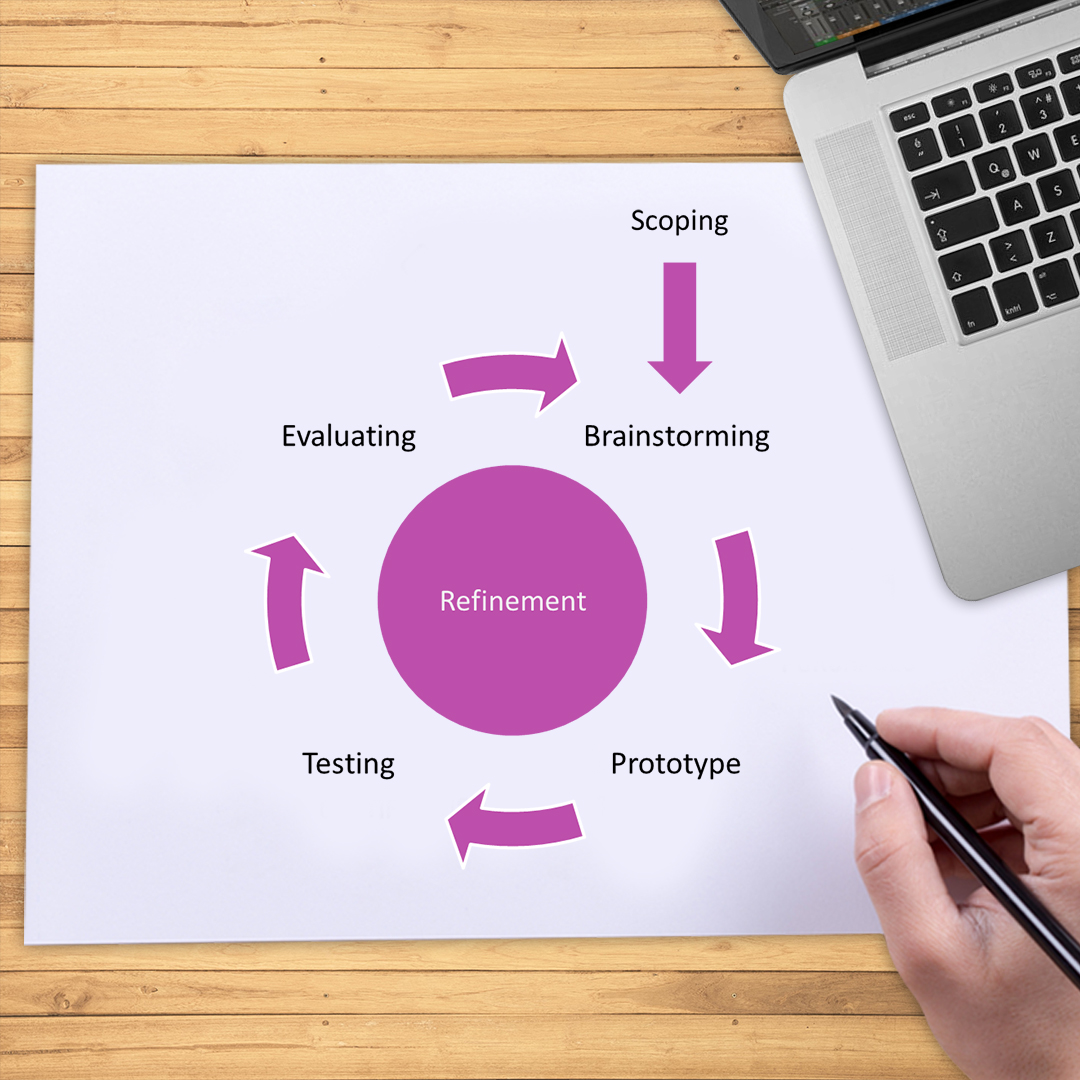5 Best Software Development Methodologies and Their Pros & Cons
How do the best software development methodologies work? And which method is the ideal option for your project? Let’s find out!
Multiple software development methodologies have been introduced in the market over the years. The purpose? To help you build better software applications through streamlined and structured workflows. However, is there a one-size-fits-all methodology for every software development team? Let’s dig a little deeper!
How Important Are Software Development Methodologies?
The software development methodology is a process framework that is used to plan, structure, and manage the development process of a customized software application. Unlike a technical framework, this methodology involves effective planning for the development lifecycle and includes the steps that are required to organize the whole process effectively. In simple terms, it is a well-crafted guide that paves the way for the software or mobile application development process.
Software development methodologies play a crucial role in the software development process. Most custom software development companies use several of these methodologies for their day-to-day operations. The basic purpose of all these methodologies or approaches is to facilitate streamlined development operations and provide a smooth structure to the complete development life cycle. Yet, there are certain pros and cons associated with each of them.
Let’s take a detailed look into the best software development methodologies and discuss their pros and cons in detail.
5 Best Software Development Methodologies
1. Agile Software Development Methodology
Agile is one of the most widely used software development methodologies among software developers today. When compared to a conventional, linear method, agile takes a different approach. Instead of giving emphasis to the documentation and the rigid procedures, it focuses on how to satisfy the end-users. These factors make it one of the top contenders among the best software development methodologies in the market.
Agile methodology is an iterative model that includes multiple tests as per the progression of the development. With this approach, the tasks are divided into short sprints of 1 to 4 weeks.
It involves continuous feedback from customers based on which modifications and changes are made to the custom software development.
Communication plays a major role in Agile, especially the communication between customers, developers, and users in distributed agile teams.

Pros of Agile methodology:
- Due to iterative effort in testing and fine-tuning, the software will have minimal defects.
- Thanks to the transparent development model, there is better clarity between team members during development.
- Changes in project requirements can be easily addressed and rectified with little or no impact on the timeline.
- Provides an overall improvement on the final quality of the custom software development.
Cons of Agile methodology:
- Due to overwhelming change requests, sometimes the team can lose focus.
- Since documentation takes a back seat in Agile, some people find it difficult to follow.
- Agile software development methodology focuses on feedback and discussions. If not managed properly, it can be too time-consuming for the team.
- Since it follows a non-structured approach, the method requires the involvement of experienced developers who can work independently.
Check out this awesome blog if you want to find out more about the amazing benefits of agile software development.
2. DevOps Methodology
DevOps is another popular term garnering a lot of attention among the best software development methodologies. It is not just a regular development methodology but encompasses a set of practices that improve collaboration between different departments. Most often departments that are responsible for different segments of the custom software development lifecycle, such as operations, development, software quality assurance, etc.

In DevOps, development, and operations function together as a single team to conduct all the processes in the complete custom software development life-cycle. And this works concurrently for all kinds of businesses. These days, businesses are opting for DevOps as an agile and lean approach that allows for a crisp collaboration between different stages of the software development life cycle. The constant integration and delivery model enables teams to perform everything simultaneously throughout the production.
Pros of DevOps:
- Accelerates multiple ongoing operations work simultaneously. By adapting to the latest trends in the industry, DevOps helps organizations to grow efficiently and drive targeted business results.
- Continuous delivery and rapid delivery microservices are some elements of DevOps software development methodology that offer business continuity to organizations. It enables organizations to constantly innovate and enhance products.
- The continuous modifications and changes ensure reliability in the infrastructure of the final product.
- It is a collaborative framework pillared on ownership and accountability. The operations teams and development teams will be in sync to deliver faster and effective final products.
Cons of DevOps:
- If you adopt DevOps as a software development methodology for your organization, it demands a significant cultural change. Your business may need to restart its processes to implement the changes and grow efficiently.
- Another factor to be considered for companies to modify their business from conventional methods is to adopt organizational up-gradation. They need to divide their tasks into multidisciplinary tasks that will let them use multiple skills simultaneously.
- DevOps software development methodology does not guarantee speed and security at all times. Therefore, for critical software projects, you may need to consider a separate approach for ensuring security at every stage of the development lifecycle.
3. Scrum Software Development Methodology
Scrum is one of the most flexible options among these best software development methodologies that are available in the market. It is based on the Agile approach and is often preferred for its iterative and incremental approaches. It involves a Product Owner, Scrum Master, and the Development Team.
The product owner gathers inputs from the client and makes sure that the team is right on track in completing the client’s needs.
The scrum master is a facilitator who ensures that the entire team is familiar with the Scrum process and the workflow. The team is in charge of executing the custom software development.
Why scrum is often considered an ideal methodology in this fast-paced environment, is because of the way the tasks are executed in the sprints. Each sprint constitutes 4 weeks.
This faster execution process enables teams to identify problems, strategize solutions, conduct testing, and gather feedback in a very short period. It makes handling fast-paced projects easier and quicker.

Pros of Scrum:
- Smaller iterations allow quick resolutions to issues.
- Scrum software development methodology is very responsive to modifications as the process includes constant feedback.
- It is effective and economical
- Frequent meetings make sure that the team members are all on the same page at all times.
- Contributions of individual team members are noticed and appreciated through each scrum meeting.
Cons of Scrum:
- All team members need to be equally skilled and committed for the Scrum software development methodology to work.
- The regular scrum meetings can be considered time-consuming by some team members.
- The methodology may increase the time-to-market for custom software development if there are no strict controls on the deadlines.
- It may not be suitable for large projects.
4. Waterfall Software Development Methodology
It is one of the oldest options among the best software development methodologies. Although it’s been decades since it was first used, this methodology is still important in some projects.

It is a simple, linear approach where the development stages are sequentially arranged in cascading processes.
It is an easily understandable and adaptable software development methodology. That is why it is highly popular among teams with lesser design and development experience.
Each stage must be efficiently completed before moving on to the next stage. For instance, all the requirements must be properly established before the web development can begin.
Pros of Waterfall:
- The linearity of the waterfall model makes it very easy to comprehend and follow, especially for new developers.
- All deliverables and specifications are clearly defined before the custom software development commences.
- Since each stage is clearly defined with clear departmentalization and control, there is no room for miscommunication with the waterfall model.
Cons of Waterfall:
- Lack of customer feedback in the initial stages of the project increases the risk of the project steering away from the target.
- Standardized QA services are only conducted at the end of the custom software development life cycle.
- It is unsuitable for complex projects as the rigidity of the model gives no room for any changes.
- The team may end up spending a lot of time on documentation instead of actually delivering solutions.
5. Prototype Methodology
Instead of creating a full-fledged software or indulging in a full-stack development process, the prototype software development methodology enables developers to work on the prototype version of the final project. The prototype is then launched for testing, evaluation, and feedback. Based on the feedback gathered, the prototype goes through several modifications until it is considered satisfactory by the user. One major reason why this approach is considered one of the best software development methodologies is its meticulous evaluation that finds potential problems before the actual custom software development commences.

The success of the approach lies not only in the development team but also in how well they communicate with the users while carrying out the tests. Also, the developers often bear the cost of developing the prototype.
Pros of Prototype:
- Effective in weeding out potential issues in the early development stages, which ultimately reduces the failure risk.
- Users are happy with the project even before the real development works actually start.
- Enables you to build a rapport with the customer early on through the discussions, which ultimately helps you throughout the custom software development project.
- Lets you collect detailed information from the prototype which can be later used to build the final version.
Cons of Prototype:
- Too much testing out the prototype can delay the development timeline.
- The expectations of the customers regarding the actual product may not align well with the prototype.
- Causes poor documentation due to constantly changing customer requirements.
- There is a risk of cost overrun if the work on the prototype is often paid for by the custom software development company.
Wrapping Up
While new software development methodologies and approaches have been introduced throughout the years, there isn’t one that dominates over others. Choosing the ideal approach among the best software development methodologies in the market entirely depends on the structure of your team, the experience you have, the project requirements, objectives, budget, and other underlying factors.
It goes without saying that nothing works one hundred percent. Every approach has its benefits and limitations that need to be taken into consideration before initiating the process. For this reason, carefully scrutinize each and every software development methodology before selecting one. The main thing to remember is that custom software development deals with a wide variety of complexities and challenges, which require expert handling. This calls for top-notch performance under the guidance of professionals who have years of experience handling and managing technical issues with efficiency.
We hope that you now have a better idea of which methodology will fit your team best for your software development project. Else, feel free to get in touch with our expert team for more assistance.



